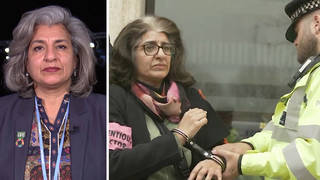
Guests
- Bill McKibbenco-founder of 350.org. He’s the author of several books, most recently, Oil and Honey: The Education of an Unlikely Activist.
Links
Bill McKibben, co-founder of 350.org, says the U.N. climate summit reveals the “scoreboard” for activists pushing governments to take action on global warming, and shows “how much more work we have to do.” He argues whatever agreement comes out of the meeting “won’t be enough” to avoid putting the world on a path to higher temperatures and an “uninhabitable world.” As France continues to ban protests at the summit, McKibben says he was moved to tears by the the outpouring of solidarity actions this weekend in 2,200 places around the world.
Transcript
AMY GOODMAN: But finally, we’re here at the U.N. COP21, Bill McKibben. The state of the talks—are voluntary standards for each country, targets, enough? What do you want to see come out of this? Do you feel it’s a failure from the start, or actually has the possibility of some kind of success?
BILL McKIBBEN: So, I’ve never sort of thought of it in either of those terms. It always seems to me like this event is not the game, it’s the scoreboard. What it reflects is what’s happened over the last five years, when we’ve built a movement all over the world. Before Copenhagen, there was no climate movement, so there was no pressure on anyone there. Barack Obama could come home from Copenhagen with a no agreement—Hillary Clinton, no agreement—and pay no price. But that’s no longer true for them or almost anybody else. So we’ll get something out of here, but it won’t be enough.
AMY GOODMAN: What will it be?
BILL McKIBBEN: Well, we’ll probably be on a path to a world that heats up about three-and-a-half degrees Celsius instead of 5 degrees.
AMY GOODMAN: And that’s, in Fahrenheit?
BILL McKIBBEN: Six or 7 degrees instead of 9 or 10. So, an uninhabitable world, OK? But what it tells us is what the score is now and how much work more we have to do. My guess is we’re going to come out of here saying, “Look, the governments of the world have done what they’re going to do for the moment—not enough. We’ve got to talk now to the people behind the governments. We’ve got to go after the fossil fuel industry, which still holds the balance of power.” That’s why this Exxon investigation is of the absolute first importance.
AMY GOODMAN: Are you concerned about the ban on protest? It was planned through Tuesday, which is just after the massive mobilization was planned for this past Sunday. Instead, there was a human chain. Now they have extended it, just for downtown Paris and right around here, through to December 13th. Direct actions were planned for December 12th. What’s the significance of this?
BILL McKIBBEN: I’m concerned about it, but what I’m gratified about is the way that the rest of the world has picked up. So last weekend, there were—we helped organize, with Avaaz and others, demonstrations 2,200 places around the globe. Just sitting and watching the pictures flow in made me cry. I mean, it was unbelievable to see people from every corner of the planet, from Cameroon, from Minneapolis, from Malawi, from Australia, from Stockholm. Everyplace else around the world, we can still protest, so it’s a good thing that there are people in those places who are stepping up.
AMY GOODMAN: Bill McKibben is co-founder of 350.org, author of a number of books, including Oil and Honey: The Education of an Unlikely Activist. We’ll be back in a minute.












Media Options